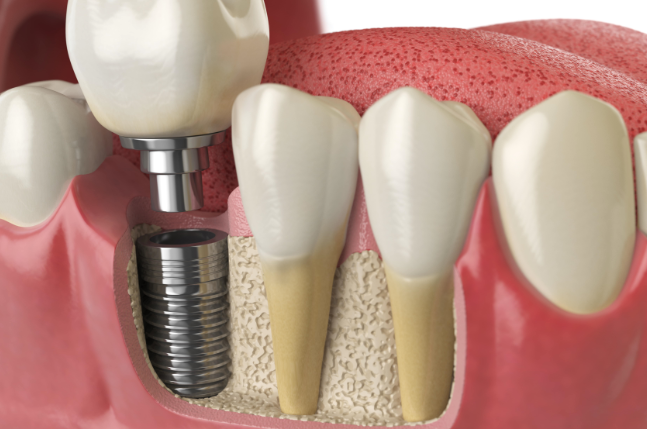
When a tooth is broken, cracked, or very decayed to a point where it can no longer retain a filling, the best cosmetic dentistry solution is a crown. A crown is an artificial replacement or covering for the part of the tooth which extrudes from the gum. Crowns are made of porcelain and are quite thin, and the crown will form a cap to fit snugly over the remains of the tooth.
(In cases where the tooth is still healthy, porcelain dental veneers are likely to be the more appropriate solution, and if the root of the tooth is decayed requiring a full tooth replacement, then dental implants may be the best option.)
Porcelain crowns look extremely natural. At a glance, a crown is completely indistinguishable from a natural tooth. And if it is well made, it will usually withstand even a close inspection by a non-dentist without being spotted as an artificial tooth.
Porcelain crowns completely cover and protect what remains of the natural tooth. They can be preferable to removable appliances and partial dentures, as they will stay in the mouth permanently and so are easier to care for.
No tooth replacements are as good or as long-lasting as a natural, healthy tooth in good condition, but porcelain crowns are an excellent solution and are extremely durable. If cared for properly, porcelain crowns can last you 10–20 years or even longer.

There are many different porcelain crowns available to give patients a beautiful smile. Dentists need to know the types of porcelain crowns to help their patients find the best option for them. For example, traditional porcelain crowns are made from feldspathic Porcelain and are considered the most beautiful. However, empress crowns have a glassy appearance that may be more desirable in some cases. Other options are Procera, lava, zirconia, and emax. Lava porcelain is very similar to traditional porcelains, but it has a better resistance against wear and tear because it is denser than feldspathic Porcelain. Zirconia porcelains are similar to feldspathic porcelains, but they have a higher strength and better longevity than the traditional porcelain crowns. And lastly, Emax is made from zircona porcelain that has been modified to be stronger than regular zirconia porcelains. Dentists should be familiar with all of these types of porcelain crowns so they can help their patients find the best option for them.
If you consider getting a porcelain crown, be sure to ask your dentist about the different types available and which one would be more suitable for you.
The average cost of porcelain crowns varies between $800 – $3,000 per tooth. The cost of Porcelain fused to metal crowns lies between $800 and $1,400 per tooth. Metal crowns (Gold alloy and mix) price range from 800 to 2,500 dollars depending on the dentist’s location and experience level. Dental insurance does help pay for Crowns, so prices may be less high than what is listed here. Always look forward to consulting with your dentist to get an accurate estimate.
If you require a porcelain crown, it is essential to know the average cost. This will help you budget for the procedure and understand what to expect. Crowns can last up to 15 years, so they are a long-term investment in your oral health.
If you have any queries about porcelain crowns or would like to schedule a consultation, please get in touch with our office. We would be happy to help!
– Porcelain Crowns typically cost between $800 – $3000 per tooth
– Porcelain fused to metal crowns (PFM) cost vary between $800
Come into Minneapolis Dental for a cosmetic dentistry consultation and find out if porcelain crowns are the best solution for your situation or needs. Or call us today at 612-332-1255. Our office is located on the 14th floor of the 150 South Fifth Street Tower (at 2nd Ave S and 5th St.) – within walking distance for those on the downtown Minneapolis skyway. We also offer complimentary parking!
Monday 8am – 4:30pm
Tuesday 8am – 4:30pm
Wednesday 8am – 4:30pm
Thursday 9am – 2:00pm
Friday Closed
© Copyright 2024 Minneapolis Dental. All rights reserved.
Created by CampaignArc.